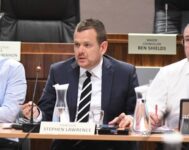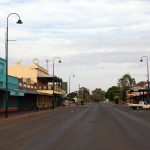Reignited Calls for a Dubbo Rehabilitation Centre, Reflect a Wider Regional Issue

Dubbo Country Labor Deputy Mayor Stephen Lawrence has reinvigorated calls for the establishment of a drug and alcohol rehabilitation centre in the central western NSW town he represents, signalling an issue that’s symptomatic of many regional and rural areas in this state.
Lawrence maintains that the lack of a local centre to deal with substance use disorder is leaving young people with nowhere to turn to, overcrowded medical facilities accommodating people that should be seen in a rehab clinic, as well as associated crime.
“There is something so fundamentally wrong with a society that will send young people into incarceration, yet, won’t even provide a simple drug detox and rehab centre,” the barrister said in a recent interview.
However, the Berejiklian government is well-aware of the lack of services in regional NSW, which results in a misplaced burden on the criminal justice system.
Indeed, Uniting held a well-publicised Dubbo to Sydney walk in late 2018 that saw a petition calling for action presented to parliament.
And the Coalition’s neglect of this matter is only compounded by the fact that a state parliamentary inquiry recommended in August 2018 that urgent planning commence with a view to establishing rehabilitation and detoxification services throughout regional and rural NSW.
A regional town in need
“We desperately need a state-of-the-art detoxification and rehabilitation centre in the Dubbo region,” Lawrence told Sydney Criminal Lawyers. “It would give people, including young people, a chance to address those issues early.”
“These are things that their family members notice, yet, at the moment, there’s no facility for them to access.”
The deputy mayor asserts that the lack of drug treatment services in Dubbo “is leading to hospital wards being used for detoxing”, high rates of opioid overdose, “young lives being wasted” and “unacceptably high crime rates“.
“It’s a social disaster that’s entirely avoidable,” he added.
The parliamentary inquiry into the Provision of Drug Rehabilitation Services in Regional, Rural and Remote NSW detailed that Dubbo has been actively lobbying the state government for such a centre since 2013 and noted that Lawrence insists a promise for one was made during the 2015 election.
The parliamentary report further sets out that Dubbo is “experiencing an increase of interrelated drug, alcohol and mental health problems, with the lack of local services meaning that people are not getting the necessary treatment”.
Statewide fair treatment
Uniting staged the October 2018 Half a Million Steps event that saw 100 supporters walk a baton containing an open letter and petition calling on the state government to do something about the lack of drug treatment in rural and regional NSW.
The walk began in Dubbo and ended in Sydney, reproducing the journey that locals in the central west town must make in order to access proper drug rehabilitation services.
“There is a massive need for more treatment services in rural and regional areas, including Dubbo. That was exposed in the 2018 NSW parliamentary inquiry,” explained Uniting NSW/ACT head of advocacy Emma Maiden.
“That was a joint inquiry with representatives from all the political parties that reached those conclusions,” she continued. “The government adopted ten of its eleven recommendations, but we haven’t seen any action.”
Maiden asserts that currently hundreds of thousands are missing out on treatment every year. And this situation is particularly dire for those in regional and rural areas, who are unable to travel the long distances for treatment, especially for services that aren’t residential.
Half a Million Steps is part of Uniting’s broader Fair Treatment campaign that not only focuses on the need for adequate drug treatment, but also calls for the decriminalisation of the personal possession and use of all illegal drugs.
Fair Treatment is supported by numerous civil society organisations, including the NSW Bar Association and the Law Society of NSW. And Maiden explained that Uniting supports decriminalisation as people with drug dependency need health support, not fines or prison time.
“The thing to remember about Dubbo is that because it’s a regional hub, you would be servicing the wider regional community,” Maiden added. “So, to not have any treatment service in Dubbo is absolute madness, especially when you consider the local problems with drug dependency.”
Rationing life-saving treatment
“Treatment capacity in Australia is about half what it should be,” said harm reduction advocate Dr Alex Wodak. “The lack of adequate alcohol and drug treatment has significant adverse consequences”, including higher levels of death “disease, crime, violence and damage to families”.
The president of the Australian Drug Law Reform Foundation states that this “insufficient or inadequate quality of treatment” isn’t apparent when it comes to other medical conditions in Australia. However, when it comes to drug treatment, services are rationed.
“The main reason for persisting poor alcohol and drug treatment is that there are few, if any, votes for politicians who make a serious effort to improve the situation,” Dr Wodak outlined, adding that families are often “too ashamed to complain”, due to the stigma associated with the condition.
The veteran drug law reformer spearheaded the campaign that led to the implementation of needle and syringe programs nationwide and he played a pivotal role in the establishment of the Uniting Medically Supervised Injecting Centre in Kings Cross.
Dr Wodak has also been a long-term campaigner for more drug treatment services.
“The default option if health and social services are unable to attend to people with severe alcohol and drug problems is law enforcement,” the doctor continued. “Illegal drug use is defined as a crime, so this makes it inevitable that police, courts and prisons will step in”.
Dr Wodak further posits that understanding society’s attempt to simply arrest its way out of this situation is now widely understood as counterproductive. And this “has prompted police to advocate for much more emphasis on health and social services to manage alcohol and drug problems”.
Neglect and short-sightedness
According to Deputy Mayor Lawrence, the reason Dubbo continues to have no adequate drug and alcohol treatment services is “a combination of neglect and short-sightedness”.
“I say neglect because the state government has year after year simply failed to meet their responsibility in terms of providing drug treatment,” the barrister concluded.
“I say short-sightedness, because this sort of service will ultimately save money and reduce government expenditure on things like policing, corrections and health.”







